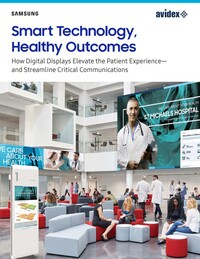5 min read
Talking About No-Nos: How Technology Can Help Reduce Patient Shaming
Admin
Aug 11, 2022 12:54:56 PM

no-no
/ˈnō ˌnō/
noun, a thing or a way of behaving that is not acceptable in a particular situation - Oxford English Dictionary
I vividly remember the first time I took myself to the doctor.
My first year of college was a thrill ride of newfound independence. I had just turned 18, moved 3 hours away from my hometown, and quickly learned to manage all the responsibilities and privileges of young adulthood. Unfortunately, the thrill ride abruptly halted halfway into my first semester with an overwhelming sense of fatigue, followed by fever, hoarseness, and a sore throat. When the symptoms didn't subside after a few days, I forced myself out of bed and made the trek to the student health clinic. Even though I was physically unwell, I remember feeling like I'd hit a significant milestone in my life. This was my first trip to the doctor without a parent. I was a bona fide grown-up!
The doctor took my vitals, asked about my symptoms, and swabbed my throat. "This looks and sounds like strep," she said. Then, she named a medication to treat it and asked if I'd taken it before.
I had taken that very medication recently. "It was horrible," I explained. "It gave me stomach cramps and nausea. I stopped it after a few days."
"You can't do that," she scolded me. "Don't EVER stop a course of antibiotics before you're finished, not unless you talk to a doctor first. THAT," she said firmly, "is a NO-NO." She lectured me on how stopping antibiotics before an entire course is finished could contribute to antibiotic resistance. She made sure I understood the weight of my negligence and how severe the consequences could be. Not just for myself but for others.
And just like that, my empowered inner adult shrank away in shame. The doctor's words and tone made me feel like a naïve child, incapable of caring for myself. Far worse than that was the feeling that I had done something wrong. I realize she had intended to educate, not humiliate, but that shame stuck in a powerful way.
Throughout the rest of my college career, I did my best to avoid going back to the student health center. Yet, even after I graduated and moved on, I'd still catch myself doing whatever I could to avoid being patient-shamed. At my doctors' appointments, I was less open and transparent, giving the bare minimum for answers to their questions. At times I'd bend the truth into responses that wouldn't elicit any scolding. The irony is that I left my university with a Health Behavior and Health Education degree. Yet, even with a deep understanding of my dysfunctional health behavior, I wasn't immune from the enduring impact of shame.
When it comes to our health, we all have our NO-NOs. Unfortunately, it could be a bigger problem than we realize. A recent literature review found that the burden of health-related shame is significant enough to be considered an important contributor or determinant of health status.1
During a recent visit to one of my client hospitals, I stepped into an empty room with the patient educator to test out their newly implemented interactive patient television system. The educator started a video on skills for managing diabetes. As a demonstration of a glucose monitor appeared on the screen, she watched intently. She said, "This is great information for patients who have monitors, you'd be surprised at how many do not." She went on to explain that during bedside teaching, she'd ask if the patient had a monitor at home, and if so, she'd ask them to describe what kind – or at least what the device looked like. Whenever a patient would say they didn't know or would dodge the questions, it often indicated that they didn't have a monitor.
Ahhh, I recognized that this was a great, big NO-NO. Fortunately, we were standing right in front of a resource that could help. That same television broadcasting a video about diabetes was also a tool to engage patients with NO-NOs in a way that humans rarely can.
Consumer researcher Anne Scherer, Ph.D., has explored our need for social approval and how it drives us to censor ourselves in social situations. "In any social interaction, we not only look for others' approval, but we also constantly fear others' disapproval when we cannot live up to their expectations," explains Dr. Scherer in her Ted Talk 'Why We're More Honest with Machines Than People.'2
Dr. Scherer delves into a study3 that evaluated soldiers for health problems after a return from combat. Conditioned to show strength and bravery, soldiers rarely report problems when the evaluation is conducted by a human being. But when interviewed by digital interview program, the soldiers report more problems, like nightmares or trouble sleeping. Removing social dynamics from the equation helped them to be more transparent in their responses.
With this in mind, my client and I explored ways we could use the hospital's interactive patient engagement solution to help those patients without monitors. We developed a message campaign to appear on patients' in-room televisions throughout the day; a photo of a glucose monitor and a prompt for requesting assistance: If you have diabetes and don't have a glucose monitor, we can help!
It wasn't long before requests started rolling in. My client reached into her supply of product samples from various manufacturers and began delivering glucose monitors to the bedside. She showed patients and their families how to use them. Patients were told they could take the devices home and were given prescriptions for strips and lancets upon discharge. They warmly received the equipment and teaching.
As we learned from patient feedback, the message was just as important as the invitation. One patient realized he wasn't alone in his predicament; broadcasting the message to a broader audience was comforting because it implied there were others without a glucose monitor, too. Considering our need for social belonging and our aversion to criticism in social and medical situations this reaction makes sense. Most importantly, the patient felt it easier to accept help when it was offered, especially when facilitated by technology, which had no agenda and made no judgments.
The power of in-room televisions to reach patients is amplified by an interactive patient system, such as Avidex's TigrPX platform, that allows hospitals to deliver important patient education and messaging to patients and visitors. These systems aid in offering creative and supportive ways to help patients see beyond their NO-NOs to leverage the resources and support they need to manage their conditions by eliminating the pressures and perceptions of judgement. Technology is a powerful medium to bring patients and healthcare providers together for conversations that can break down barriers, pave a path toward change, and ultimately result in better health outcomes.
"Machines can remind us of a central element of what makes a good conversation partner: being nonjudgmental," states Dr. Scherer." Try to be less judgmental when another person openly shares their thoughts, feelings, and problems with you. Many machines do this already, and maybe so should we."4
About the Author
 Amy Mora joined the Avidex family in 2014 as a Client Outcomes Manager. Her 25+ years of healthcare experience includes working as the patient education coordinator for a large healthcare system in North Carolina. Amy has also authored an educational fiction series of stories about interpersonal issues impacting the healthcare workforce.
Amy Mora joined the Avidex family in 2014 as a Client Outcomes Manager. Her 25+ years of healthcare experience includes working as the patient education coordinator for a large healthcare system in North Carolina. Amy has also authored an educational fiction series of stories about interpersonal issues impacting the healthcare workforce.
She is a Certified Patient Experience Professional (CPXP) and has an extensive academic background in health behavior, health education, and health administration, and is a LEAN Six Sigma Green Belt and a former EMT-Intermediate. Amy is excited about supporting her hospital clients in their efforts to create better patient experiences and health outcomes.
[1] Dolezal, Luna, and Barry Lyons. “Health-related shame: an affective determinant of health?.” Medical humanities vol. 43,4 (2017): 257-263. doi:10.1136/medhum-2017-011186
[2] Scherer, A., 2021. Why we're more honest with machines than people. TED Conferences. https://www.ted.com/talks/anne_scherer_why_we_re_more_honest_with_machines_than_people/
[3] Lucas, Gale M. et al. "Reporting Mental Health Symptoms: Breaking Down Barriers To Care With Virtual Human Interviewers." Frontiers in Robotics and AI 4 (2017): n. pag. Web. 20 June 2022.
[4] Scherer, A., 2021. Why we're more honest with machines than people. TED Conferences. https://www.ted.com/talks/anne_scherer_why_we_re_more_honest_with_machines_than_people/

